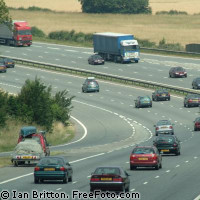Potocnik calls for move towards intelligent transport system
EU Science and Research Commissioner Janez Potocnik has called for an integrated approach to developing a cleaner, safer and smarter road transport system. Speaking at the Transport Research Arena (TRA 2008) conference in Ljubljana, Slovenia, on 21 April, the Commissioner reminded delegates that transport and mobility are at the very heart of Europe's economic growth. 'For centuries, innovations in transport of all kinds have generated prosperity. Over the last fifty years, increasing mobility has been at the core of economic growth in the European Union,' he said. In particular, road transport contributes significantly to the economy, with services accounting for 1.6% of our GDP and offering jobs to 4.5 million people in the EU. The whole economy and society depends heavily on efficient road transport; 44% of the goods are moved by trucks and 85% of people by cars, buses or coaches. But the transport sector is facing new challenges. Competitive pressures have intensified recently with the arrival on the market of cheaper cars, while oil prices continue to soar. The sector is also under pressure to tackle its emission levels, which account for 26% of Europe's total greenhouse gas emissions. Commitment has already been won to reduce carbon dioxide emission from new cars to 120 grams per kilometre by 2012 - a reduction of around 25% from current levels. 'This will help, but it won't be enough to meet our wider obligations to making Europe a low-carbon economy,' said the Commissioner, adding that freight and passenger transport are set to grow significantly in the coming years.' In order to succeed, the road vehicles of the future need to be greener, cleaner and smarter, noted Mr Potocnik. This is where research comes into play. The transport sector is a big research spender, investing more than any other European industrial sector. Member States are also addressing relevant technologies, such as alternative fuels and hydrogen and fuels cells, while the EU has dedicated €4 billion to transport-related research over the seven years through its Seventh Framework Programme (FP7). 'Does that mean that we have all the funding that we need? No, almost certainly not. But can we be more effective with the resources that we have? Yes, I am absolutely certain of it,' said the Commissioner. But effective research spending will only happen through effective coordination, believes Mr Potocnik. 'Building sustainable road transport needs a systemic approach. An approach that links vehicles, infrastructure and users, and that links users with other users,' he went onto say. In order to achieve this seamless web of integrated transport chains, better communication between carmakers, researchers and policy makers is needed. 'Good partnerships are based on communication; and the Transport Research Arena is your chance to exchange views and build understanding about what each of us - researchers, industry, policy-makers - needs from the others,' Mr Potocnik reminded delegates. Jointly organised by the European Commission, the European Road Transport Research Advisory Council (ERTRAC) and the Confederation of European Directors of Roads (CEDR), TRA 2008 tackles a number of key transport issues. These include urban mobility, new engines and power trains, alternative fuels, hydrogen technologies, future vehicle concepts, 'smart' cars, intelligent logistics, active and passive safety, improving infrastructures in new Member States, noise abatement, emissions reductions, and the low carbon transport economy. Also helping to pool Europe's research potential in the sector is the Transport Research Knowledge Centre (TRKC), which recently relaunched its web portal. The portal features up-to-date information on transport research activities, offering policy makers, researchers and other stakeholders easy access to the results of EU or nationally funded transport research.
Countries
Slovenia



